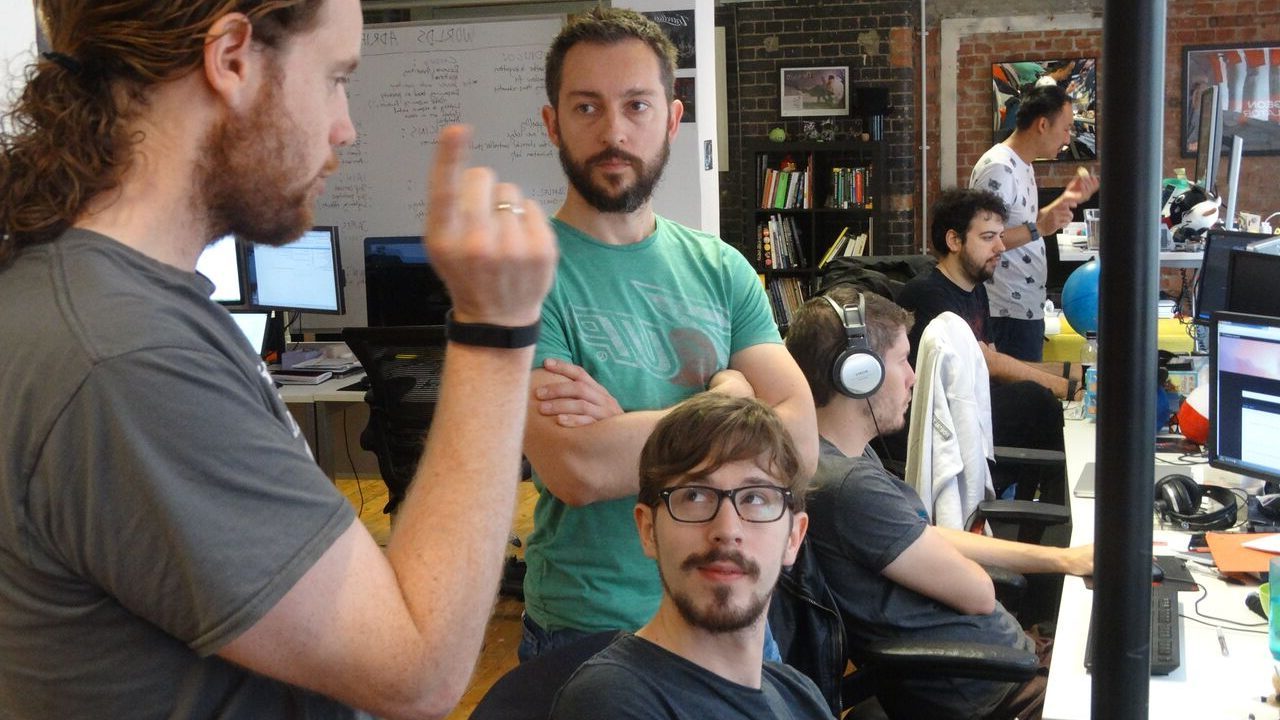Thriving Futures: A Rough Guide to Game Careers

Recently we looked at the benefits of talking to your family's younger members about considering a career in games, whether as a means to set them on track for their dream job, or as a way to engage them with their education and help them develop a skill set that can be applied to numerous future jobs.
This week, we're going to look at the broad types of roles there are in making games. The outline below doesn't cover every possible role in games, because as the medium and technology advance, myriad new specialties are emerging. These days some studios have lawyers, economists, psychologists, combat choreographers and even in-house masseuses on their teams, but for now at least, we'll cover the more common ways to make a good living creating games.
Equally, many games makers embrace a combination of the roles below, developing their own unique contribution to developing games, or even doing everything themselves.
What this overview does, however, is give a general guide to the predominant roles and career categories that crafting games includes. Starting in the new year, with the support of our friends at PEGI, who help make Ask About Games possible, we'll look at each one in detail, considering what it involves, what its place is in the process of creating a game, the skills needed, and the best way to pursue the job.
First, though, lets get one clarification out of the way. A 'game developer' is often used as a general term for those that make games, and covers most of the roles below. It generally covers those involved in the design and creation of games, rather than those employed supporting games in various ways.
And as each week progresses, we'll add links to each career guide to the title of each section below, so you can easily find the guide to a particular role, and discuss it with your youngsters; just as you can with this guide.
Game DesignerThere are many types of game designer – including gameplay designer, level designer and character designer – and in many cases designers combine different types of game design. They can even handle game art and game coding, depending on how many people there are in their team. Bigger teams have more distinct roles, while small teams often see their staff choosing to combine skills. Generally speaking, game designers come up with the ideas behind how a game works, what it includes, and how all the elements within it from characters and story come together. Game designers often lead the game development process.
Game ArtistsAs with game designers , there are several different types of game artist, from those that shape levels and scenery to others that flesh out characters or vehicles. Some artists are 'technical artists', meaning they might work out a way to make lighting behave in a certain way, or design a technology that makes fabric look realistic. While most game artists work on computers, some use very traditional painting and drawing skills, perhaps creating 'concept art' which provides a guide to the rest of the team as to how a game might look and feel in the future. Another type of game artist is the game animator, who breathes life and movement into a game's characters and environments.
Game ProducerThere are many different approaches to game producing, but in general game producers keep everybody working on the same page, making sure a game comes together as planned, on time, to budget, and at a top standard. Sometimes game producing can be a managerial role, and in other cases it can be creative. Game producers normal sit at the top of a team, working with lead game designers and game directors.
Game Coder/ProgrammerQuite simply, game coders create the code that makes a game work. Coding games is often as creative as it is technical, and while code is the magic that makes game designer's ideas come to life, coding can equally have an influence on the ideas and gameplay. Indeed, many game developers combine game design and game coding roles. Game coders are problem solvers, technical masterminds and designers all in one. Some game coders take on very specific roles, such as an online multiplayer coder.
Game WriterOften a game writer pens the script for a game, but they also do much more than that. Game writers might contribute 'world building', where they provide back-stories and supporting documents to help players – or fellow developers – understand a game world and the motivations of characters within it. Some world building content might not even be included in a game, but is vital to it feeling convincing. Game writers often deliver other in game text, and even work with performers and audio specialists to adapt game dialogue as it is performed and recorded.
Game PerformerGame performers include voice over artists, actors, and even athletes and stunt experts who do motion capture work – meaning special cameras record their movements, and then use the recording in-game to make a fictional character move realistically.
Game Audio SpecialistThere are many types of game audio role, from those that record and edit voiceovers, to composers that score game soundtracks, as well as game sound effect designers and creators, wand recording artists that go out into the world to capture real sounds. Technical game audio roles see staff, for example, help make sound behave as if it were in a 3D space, or even develop ways so that music in a game can react to the action on-screen, changing by the second.
Game Tester/QA/Localisation SpecialistA tester helps make sure a game functions properly as it is made. There are many types of tester, and their skills and contributions often cross over with game designers, coders and engineers. Some testers carry out QA – meaning 'quality assurance' – which focuses on being sure a game works on the consoles it is designed for, that the online elements of a game work smoothly, and so on. Traditional testers are more concerned with testing gameplay, and finding errors in a game – perhaps where some visuals are not showing up properly. Localistaion, meanwhile, is about translating a game. That can mean translating a language, but it also means making a game culturally appropriate for different parts of the world. Sometimes, translating also impacts design. A language with lots of long words, for example, might mean menus and lots of other art needs redesigning. The testing roles are considered a good starting point for a career in games, though many testers enjoy staying in their specialty for their entire careers.
Esports CompetitorAlthough it is still culturally less highly thought of than physical sports, there is a huge opportunity for individuals to partake in the eSports market. The audience is expected to grow to reach 8 million people by 2019 and according to PWC, will reach £8m in consumer ticket sales by 2021. Digital advertising in eSports will increase to £12m by 2021.
Esports is popular with millennials in the UK, with the 21-35 age group representing 63% of the market. Women make up 31% of the audience and are most likely to watch when aged between 21-35. Many competitions have large prizes up to $1 million. It's no surprise that football clubs including Manchester City and West Ham have signed professional eSports players.
This part of the games industry requires a wide range of skills on the part of the participant, as well as the surrounding infrastructure and supporting roles the large teams require. Players can test the waters by getting involved in the grassroots eSports scene in the UK's universities, where over 3,000 players compete in the National University Esports League.
Professional Video Game StreamingSimilar to the popularity of watching professionals play sports on television, the rise of YouTube and Twitch has led to possible careers for individuals to make money from playing video games. To do well at this role you need to have a range of skills, from the technical setting up of the streams to being able to play and talk at the same time. It also relies on individuals presenting a friendly persona and managing the social media aspect of being online. It can take a lot of effort to establish an audience but the benefits are a number of income streams that include donations from viewers, advertising revenue and sponsorship deals.





